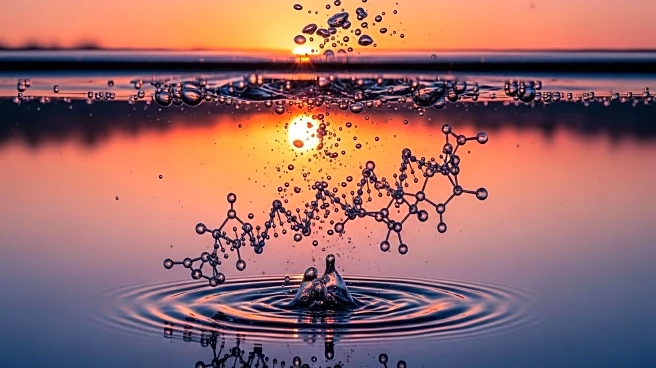What's Happening?
Researchers at University College London, led by Professor Matthew Powner, have identified a water-friendly chemical reaction that may explain the formation of proteins, a crucial component of life, before the existence of complex cellular machinery. The study demonstrates how RNA, a molecule responsible for storing and transferring genetic information, can chemically link with amino acids under mild conditions in water. This linkage occurs without the need for enzymes, suggesting a possible pathway for early protein formation. The research highlights the role of thioesters, sulfur-containing compounds, in driving these reactions, which are similar to those found in modern cellular metabolism.
Why It's Important?
This discovery is significant as it provides a plausible explanation for the origin of life on Earth, bridging the gap between simple chemical reactions and complex biological processes. Understanding how proteins could form in prebiotic conditions offers insights into the early stages of life development, potentially linking metabolism, genetic coding, and protein synthesis. The findings could impact various scientific fields, including biochemistry, evolutionary biology, and astrobiology, by offering a model for how life might arise in similar conditions elsewhere in the universe.
What's Next?
Future research may focus on exploring the sequence preferences that could lead to specific RNA and amino acid pairings, moving from simple chemical reactions to coded genetic instructions. This could further elucidate the evolution of the genetic code and the development of ribonucleoprotein machinery like the ribosome. Additionally, scientists may investigate the environmental conditions on early Earth that facilitated these reactions, such as the role of minerals and freeze concentrate cycles in enhancing chemical processes.
Beyond the Headlines
The study suggests a potential resolution to the 'chicken or egg' problem in biology, where RNA and proteins are interdependent. By demonstrating a method for RNA to handle amino acids without proteins, the research supports the hypothesis of an RNA-peptide world, where RNA and short peptides co-evolved. This could lead to a deeper understanding of the transition from simple chemical systems to complex biological organisms.









